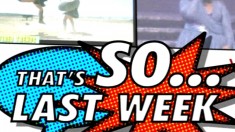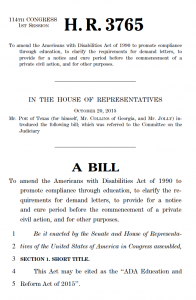 Today’s Google news brought another batch of outraged articles about serial ADA plaintiffs and legislators looking for solutions to the ADA litigation epidemic. The serial filer was in the Wichita, Kansas area, and the legislators were in Colorado, but otherwise the stories were pretty much the same as the stories last week, and the week before, and the week before that. Business owners say they were surprised to find that they were not ADA compliant, and lawmakers say the law should require a pre-suit demand so businesses have a chance to fix their problems before they get sued. The plaintiff, or his lawyer, always points out that the ADA has been in effect for 25 years, so it shouldn’t really be news. More
Today’s Google news brought another batch of outraged articles about serial ADA plaintiffs and legislators looking for solutions to the ADA litigation epidemic. The serial filer was in the Wichita, Kansas area, and the legislators were in Colorado, but otherwise the stories were pretty much the same as the stories last week, and the week before, and the week before that. Business owners say they were surprised to find that they were not ADA compliant, and lawmakers say the law should require a pre-suit demand so businesses have a chance to fix their problems before they get sued. The plaintiff, or his lawyer, always points out that the ADA has been in effect for 25 years, so it shouldn’t really be news. More
ADA – drive-by litigation
Arizona Attorney General Intervenes to stop abusive ADA litigation
By Richard Hunt in Accessibility Litigation Trends, ADA - drive-by litigation, ADA - serial litigation Tags: ADA lawsuit abuse, Arizona Attorney General, serial litigation, Steven Trotten, Strojnik
 This is just a quick note about a major development in the story concerning thousands of lawsuits filed in Arizona by a purported disability rights group. The attorney involved, Peter Strojnik was mentioned in two of my blogs earlier this year. The Economist covers serial ADA litigation – Hunt quoted and Cheap Standing under the ADA. After investigations by the press and local authorities the head of the plaintiff organization has resigned and the Arizona Attorney General has intervened in an effort to shut down the litigation mill. You can read the most recent in a series of stories by Steven Trotten HERE and read the Motion to Intervene HERE. More
This is just a quick note about a major development in the story concerning thousands of lawsuits filed in Arizona by a purported disability rights group. The attorney involved, Peter Strojnik was mentioned in two of my blogs earlier this year. The Economist covers serial ADA litigation – Hunt quoted and Cheap Standing under the ADA. After investigations by the press and local authorities the head of the plaintiff organization has resigned and the Arizona Attorney General has intervened in an effort to shut down the litigation mill. You can read the most recent in a series of stories by Steven Trotten HERE and read the Motion to Intervene HERE. More
Is this a service animal under the ADA?* What Arizona can teach the Department of Justice.
By Richard Hunt in ADA, ADA - drive-by litigation, ADA - serial litigation, ADA FHA Legislation, ADA Internet, ADA Internet Web, ADA Miniature Horses, ADA regulations, ADA rulemaking, ADA service animals, DOJ, Uncategorized Tags: ADA service animals, miniature horses, service animals
 Reading the daily update I get on disability law issues I was struck by this sentence from an article published on August 8 in the Daily Courier from Prescott Arizona:
Reading the daily update I get on disability law issues I was struck by this sentence from an article published on August 8 in the Daily Courier from Prescott Arizona:
“The Arizona Legislature altered laws this year that govern those service animals, specifically allowing businesses, especially restaurants, to tell an owner the animal must be removed if it is out of control or not housebroken.”
(Click here for complete article). This is interesting because the “altered law” does not appear to change anything. Under both the ADA and its Arizona equivalent businesses have always been entitled to exclude service animals that are out of control or not housebroken. Other details in the new law are also consistent with existing federal regulations concerning service animals. More
ADA reform legislation moves forward
By Richard Hunt in Accessibility Litigation Trends, ADA - drive-by litigation, ADA - serial litigation, ADA Attorney's Fees Tags: ADA Legislation, ADA Reform, H.R. 3765, Senator Poe
 On July 7 H.R. 3765, the ADA Education and Reform Act of 2015, passed out of the House Judiciary Committee. H.R. 3765 is one of several pending ADA reform bills targeting “drive-by” or serial litigants. They share a common approach, requiring that plaintiffs give notice before filing suit so the problem can be fixed. They also share a common reaction from the disabilities and business communities. Disability advocates vehement oppose the bills while business groups support them.
On July 7 H.R. 3765, the ADA Education and Reform Act of 2015, passed out of the House Judiciary Committee. H.R. 3765 is one of several pending ADA reform bills targeting “drive-by” or serial litigants. They share a common approach, requiring that plaintiffs give notice before filing suit so the problem can be fixed. They also share a common reaction from the disabilities and business communities. Disability advocates vehement oppose the bills while business groups support them.
We’ve blogged about H.R. 3765 before (click HERE and HERE to read the earlier blogs). Our prediction that the bill would go nowhere is proving wrong, but our criticism of the bill’s likely effectiveness hasn’t changed. Serial litigation is driven by cheap standing and the economics of defending a lawsuit in federal court, neither of which will be changed by this bill. There is something in the bill that all sides should agree on – a requirement for more ADA education. Unfortunately, this requirement comes without any funding, so it is unlikely to be effectively implemented. The best way to reduce litigation and help the disabled involves seriously funded education for business and coordination of ADA compliance requirements with the building inspection process at the local level. This would improve ADA compliance before a suit was filed or demand letter sent, and that would have the effect of moving resources from attorneys fees to accessibility. Private enforcement of the ADA through litigation is the most wasteful way to achieve the goals of the ADA, and as long as litigation is the main tool for enforcement the lion’s share of money will go to lawyers instead of improvements in accessibility.
“Avoiding ADA Lawsuits – A DIY Guide” – Register now for our June webinar.
By Richard Hunt in Accessibility Litigation Trends, ADA - drive-by litigation, ADA - serial litigation Tags: "drive-by" ADA lawsuits, ADA parking, ADA serial litigation, lawsuit abuse
How do serial ADA litigants manage to file dozens of lawsuits at a time? It certainly is not because they conduct formal ADA surveys of the properties they sue. On June 22, 2016 at noon Central Standard Time we will present our free webinar “Avoiding ADA Litigation – A DIY Guide.” We will show you how so called “drive-by” ADA plaintiffs spot their targets and teach you how to conduct an informal ADA review of the features most likely to put you in the crosshairs of a serial ADA litigant. We will show you what tools you need (not many and all cheap) and provide diagrams and pictures to help you spot problems and decide whether you need to hire an ADA consultant. With serial plaintiffs and their lawyers continuing to troll the streets of American cities looking for victims this is must know information for any business large or small. Just click this link to register.
“Avoiding ADA Lawsuits – A DIY Guide” is part of our monthly series of free webinars for business. Look for the announcement of our July webinar, “Phoney business – dealing with “tester” phone calls.” We will cover what apartment managers, leasing agents and real estate agents need to know about calls from Fair Housing Act testers, including what to say and what not to say to avoid a HUD complaint.


